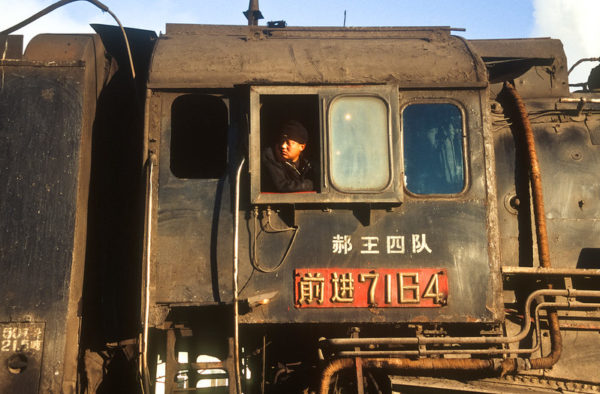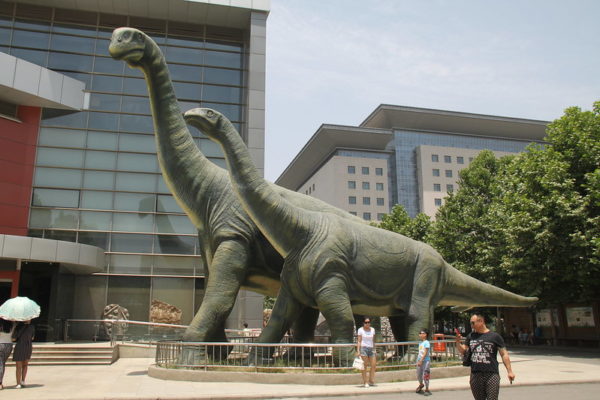
Clouds, by Xianyi Shen (CC BY-NC-ND 2.0)

Clouds, by Xianyi Shen (CC BY-NC-ND 2.0)
The Chinese government has been courting the Global South to advance its image as a responsible guarantor of international security and development. Last week, China took the initiative by hosting the first China-Horn of Africa conference in Addis Ababa, Ethiopia, followed by the 14th BRICS summit in Beijing. The resulting joint-statements praised Xi Jinping’s new Global Security Initiative (GSI) and sought to rally states around non-Western approaches to international affairs, despite producing little substantive action. However, in a bid to reinforce public traction for Beijing’s leadership, Chinese state media content has made its way into local media coverage of these conferences, demonstrating that media continues to be an important vessel for China’s global ambitions.
Describing the “international political signalling” emerging from the Horn of Africa conference, Lukas Fiala, a project coordinator at the London School of Economics IDEAS think tank, argued that the conference “provides us with another glimpse into the role of security arrangements in China’s future as a global power,” given China’s recent security agreement with the Solomon Islands and ongoing support of Russia’s war against Ukraine. As Garrett O’Brien reported in The Wire China, these arrangements take the form of “peace with Chinese characteristics”:
Billed as being derived from “diplomatic tradition and wisdom with unique Chinese characteristics,” the [Global Security Initiative] is a six-point plan that reflects Beijing’s long-standing emphasis on national sovereignty, including individual countries’ right to choose their own development paths, as well as its desire to resolve conflicts through “dialogue and consultation.”
[…] Yet this week’s conference has also demonstrated some of the potential inconsistencies in Xi’s blueprint for Chinese diplomacy, in particular its emphasis on non-interference in other countries’ internal affairs. Its latest foray into African politics is, in fact, a “formalization and acceleration of China’s active diplomacy or, in this instance, ‘soft interference’ in the domestic politics of others,” says [Seifudein Adem, professor of global studies at Doshisha University in Japan].
[…] “The fact that China was able to host this conference to begin with is already its biggest achievement,” says the Stimson Center’s Yun Sun. “This [was] not a typical peace or conflict mediation conference as we normally would envision. This [was] more of a conference where China gathered the countries of the region to come together and talk about China’s vision.” [Source]
Guled Ahmed, a non-resident scholar at the Washington-based Middle East Institute, said that the conference “serves as an alternative Chinese peace model (addressing only lack of development) to replace Western countries’ conflict resolution approach (focused more on strong intuition and democratisation), which serves well in authoritarian and less democratic countries with bad human rights records.” According to Ovigwe Eguegu, a policy analyst at Development Reimagined, African countries are a prime audience, particularly those that adhere to the principle of “non-interference.” He added that the GSI could provide these nations with an opportunity to hold greater sway in global economics and geopolitics. Redwan Hussein, a national security advisor to the Ethiopian prime minister, framed China’s mission as mere facilitation: “This initiative is owned, directed, managed, and steered by countries of the Horn of Africa, and China has only a supporting role.”
But an examination of African local media coverage suggests that China intends to play a much greater role, particularly in terms of shaping public opinion about Chinese engagement in Africa. A CDT analysis, described in more detail below, reveals that in the lead-up to the Horn of Africa conference, numerous media outlets from at least two of its African participants, Uganda and Kenya, published a number of attributed and unattributed articles from Chinese state media praising China’s engagement in the region. This tallies with a recent report by the German Marshall Fund titled “China and the Digital Information Stack in the Global South,” which examines how China carries out digital information operations to advance its strategic goals and render the world more hospitable for autocracy. In one case study on Uganda, the authors analyze the rise of content-sharing agreements between Chinese and Ugandan media groups:
Among the most prominent of these has been that between PML Daily, a major Kampala-based news website, and Xinhua News. Such agreements can be mutually beneficial: PML Daily gets unlimited license to republish and distribute Xinhua’s stories, providing more content to readers while reducing the burden on its staff, while China dramatically expands its media penetration in Uganda, allowing it to promote narratives favorable to Chinese interests.
[…] Some information manipulation is much more malevolent, and a major focus of Chinese information manipulation efforts over the past two years has been the global COVID pandemic. Chinese media outlets have pushed back strongly against any suggestion of Chinese responsibility for the pandemic, going as far as to push conspiracy theories blaming American military laboratories. State-backed news agencies, like the China Daily, play up cooperation between China and Uganda on COVID vaccination, using China’s “vaccine diplomacy” to frame China as a responsible world leader, and a partner for Uganda’s government.
Outside the realm of COVID, Chinese news agencies with readership or viewership in Uganda also push support for the regime since it has been a convenient partner for the CCP. This includes stories by CGTN Africa framing [Ugandan President Yoweri] Museveni as a regional leader on economic and political integration. Even more problematically, Chinese news agencies have worked to legitimize Museveni and Uganda’s authoritarian political system through stories that validate his election victory and ignore or downplay allegations of fraud and intimidation. Through content sharing agreements, these stories are seen by many Ugandans on Ugandan news websites with few clear indications they come from Chinese media firms. [Source]
Shortly after the conference, on June 23, Uganda’s Daily Express republished a Xinhua article describing the resolve of Xue Bing, the Chinese Special Envoy for the Horn of Africa, to continue supporting countries in the region. (It had also republished two more Xinhua articles the week prior.) On June 22, Ugandan media outlet Red Pepper used a local byline to publish an article that, apart from some light edits, echoed the wording and structure of a previous Xinhua article about the conference. The text of the slightly reworked Red Pepper article reads, “The countries of the region commend China for initiating” the conference, “commit to actively participate in implementing the Global Development Initiative and the Global Security Initiative,” and “[express their] gratitude to China for providing COVID-19 vaccines.” And last month, the magazine section of The Monitor’s Uganda edition published a longform article by the Chinese ambassador to Uganda offering fulsome praise for the GSI.
Other local Ugandan outlets have recently carried Chinese state-media content unrelated to the conference. Among the last 25 China-related articles published since January 1 by Uganda’s The Independent, all but three were republished from Xinhua, and feature headlines such as: “China’s Digital Silk Road solution to corruption in Africa: AU experts,” “How China’s zero-COVID policy works without compromising economic, social development,” and “Xiconomics: Why China’s vision for development can help promote global prosperity.” Last month, Uganda-based East African Businessweek ran an op-ed, written by the director of an economics think tank sponsored by China’s Ministry of Education, that justified China’s zero-COVID policy.
Similar content has appeared in local Kenyan outlets. Five of the last six China-related articles published this month by state-owned Kenya Broadcasting Corporation (KBC) were from Chinese state media (the sixth describes a survey about pro-China sentiment in Africa). Just before the Horn of Africa conference, KBC published two articles from CGTN and Xinhua praising China’s Global Development Initiative. One of these articles appeared under the headline “China vows to work with Kenya to defend interests of developing countries.” Another local outlet, Capital News, ran the exact same article. Three of the last nine China-related articles published by Capital News were sourced from CGTN. The Star carried one Xinhua article on the GSI in late April. During the BRICS conference late last week, the homepage of The Nation hosted a Xinhua-sponsored article promoting BRICS efforts to combat climate change.
Chinese state-media outlets Xinhua and CGTN both maintain regional offices in Kenya, and some local journalists from Kenya and Uganda have attended sponsored training and other exchange programs in China. According to a senior editorial director in Kenya, Xinhua has made inroads in Kenya by developing close links with local journalists and media personnel. DoubleThink Lab’s China Index has also documented other forms of Chinese influence in the Kenyan media landscape, such as local outlets running free content provided by Chinese state media, being partially owned by Chinese entities, or being part of state-media-sponsored networks. While Chinese diplomacy in the Horn of Africa may not succeed in solving the region’s conflicts, China’s state-media influence may help to persuade the public to embrace the Chinese government’s narrative that it is “a force for good” in the region.

Untitled (Jining–Tongliao Railway, Inner Mongolia), by Jim Maurer (CC BY-NC-ND 2.0)
Two years and four months after whistleblower Dr. Li Wenliang’s death from COVID-19, the comments section under his last Weibo post, which has become known as “China’s Wailing Wall,” continues to serve as a repository for the hopes, dreams, worries, and opinions of countless Chinese citizens. CDT editors regularly archive and translate Wailing Wall content, including the selection of comments below.
In early June, a number of commenters referenced June 4, the thirty-third anniversary of the violent crackdown on the Tiananmen protests in Beijing, and wondered how many of their fellow citizens were even aware of the significance of the date, given strict government censorship of any online commemorations. Throughout the month, many Wailing Wall visitors focused on current events such as the brutal beating of four women at a hotpot restaurant in Tangshan and the reported misuse of health codes by officials in Henan. Students awaiting university entrance exam (gaokao) scores confided their hopes and anxieties; workers discussed wages, the cost of living, potential layoffs, and how their livelihoods had been affected by China’s pandemic lockdowns. Commenters of all ages and walks of life described coping with COVID testing, app-based health codes, and circumscribed freedom of movement during the pandemic. As always, there were expressions of gratitude and admiration for Dr. Li’s courage during his lifetime, well-wishes for him in the afterlife, and requests for his blessing and protection in these uncertain times.
The following Wailing Wall comments, selected and translated by CDT editors, were originally posted during the month of June, 2022.
Comments from May 30-June 4, 2022:
听说名字可以取这么长哦哟:Already, many people are unaware of the significance of this date [June 4].
Mazkew: This Dragon Boat Festival memorializes both Qu Yuan and Dr. Li. Someday, when people look back at this period of time, Dr. Li should be regarded as a modern-day Qu Yuan. But the tragedy is that over the last two thousand years, some things haven’t changed.
Hooger-: History is still being written, and we will remember all of this. The former, writ upon a monument; the latter, etched upon a pillar of shame. Thank you for your sacrifice, Dr. Li. [Chinese]
Comments from June 5-12, 2022:
蜡笔小丸子131:Dr. Li, how are you, over there? I’m not doing well today. This overwhelming tide of brutal news has made me lose my last shred of faith that this society is safe. We teach girls to go home early, and not to wear revealing clothes, but why doesn’t anyone teach boys that it’s not okay to harm women? It’s really upsetting. What do we have to do in order to live in peace and safety?
朝不虑夕2333:If this matter isn’t dealt with properly, then how can we ever trust our government?
劉雅文Emilio:Dr. Li, I feel like society is bleak. On the night of April 27, it was raining, and I went to pick up my mom from work, and was followed by a strange man. Luckily, I ran fast and nothing bad happened. After seeing the news about the Tangshan incident, I was so sad, I couldn’t sleep. There are so many bad people. How can they expect women to give birth to three kids while at the same time, not doing anything to protect women? I saw some comments saying that the women who were beaten weren’t good women because they went out to drink and eat barbecue in the middle of the night. ? ? ? It’s 2022. Do women really have to be careful about what time they pick to go out for a meal?
Coolbigcat: Doctor Li, my 13-year-old Weibo account @漂亮的大猫 got blocked because I said something similar to what you said. How are you? The world isn’t getting better and better as you imagined. We’re getting further and further away from the life we want.
凌晨的海w:I still don’t want to believe that this is China in 2022. There are some things happening in this country that I can’t quite bring myself to believe.
馋少年肉体的妖艳货色2:My memory will not be erased by “correct collective memory.“
_YANGZAI: Received an offer and took the first step to “run” to Hong Kong, but it seems Hong Kong is becoming more and more like the mainland. [Chinese]
Comments from June 13-18, 2022:
野生的奈奈阿: Dr. Li, I feel so hopeless and helpless. I can’t seem to do anything but cry and constantly doomscroll for news about Tangshan. I’m trying to stay rational and not believe random rumors, but why won’t they publish an announcement about the condition of those girls? Why haven’t we heard anything from the victims’ families?
四季稻F:You surely never imagined this, but health codes are already being used as a tool to restrict the movement of certain groups of people. How can they do this? // 幼稚_鬼:Never underestimate evil.
要和咩哥去海边:What these two incidents have in common is that all of us—you, me, the four girls in Tangshan, all of us ordinary people—are just trying to protect ourselves and the people around us. It’s that simple, but it never turns out well for us, does it? How is that not scary?
missLisasa: Dr. Li, they are bad people, rotten to the core. As a person born in 1989, suddenly now in 2022, I am utterly disappointed in this place I used to be so proud of!
张誉酩:I’ve been pretty happy recently. I met the right person and have a stable, satisfying relationship. Life’s not easy, but I try to be a kind person.
叶问天行:There have been no concrete updates on the Tangshan beating case, and there’s no way of knowing what steps have been taken regarding complaints [about gang violence] that people filed under their real names. Right now, Tangshan exists in a state of suspicion, cloaked in mystery. It’s like entering Tangshan has become a crime, and anyone who does is monitored. What are they so afraid of? Why haven’t Hebei’s leaders issued any concrete statements? Is it because they’re afraid of losing their cushy jobs?
-二吉:Dr. Li, I am applying for a job tomorrow, and I hope everything goes smoothly! Since graduating, I don’t seem to be very happy. Mostly I worry about the future. I don’t know what my future will look like. Will I be able to become an outstanding doctor? Will I be able to live the kind of life I want? I don’t know. All I can do is try my best with each task at hand, and hope for a good future. Also, I’ve recently discovered that this world is not as wonderful as we imagined.
太阳的麦兜:Dr. Li, the only reason I’ve been reluctant to uninstall Weibo is this place of yours. With so many friends who come here to call on you, you probably don’t have time to read all the messages. Even when we’re getting rained on, we always try to hold up an umbrella for others. Please remember those girls [who got beaten up in Tangshan]. Pray for them!
我就像没睡醒:The two most shocking sentences of 2022: “The world doesn’t want me anymore” and “We’re the last generation.” [Chinese]
Comments from June 19-26, 2022:
九味人生lww:Dr. Li, the violent incident in Tangshan has made us angry, and the foot-dragging by Tangshan’s local government has left us speechless. Henan’s red health codes are frightening everyone, and today from Shandong, there’s news of [people with too much money in their bank accounts being accused of] “maliciously refusing to buy homes” … Living isn’t easy.
-今天不饿TvT:Brother Liang, I want to make a secret vow—to become a person who isn’t cowardly or indifferent, who isn’t hesitant, or afraid, or nervous. If you happen to remember and have time, maybe you can give me a quiet helping hand. I do want to improve myself. Wish me luck~
四明山心:Governing the country with health app codes
Resaide喽:Dr. Li, I couldn’t stand to watch all of that video from Dandong … It’s getting too hard to live …
啊邪pig:Dr. Li, I was in an unfamiliar area today, searching everywhere for a hospital where I could get a nucleic acid COVID test. In the hospital lobby, I met a really kind-hearted and helpful older man. It made me so happy. // Gnemouz: The kindness of strangers can really warm your heart.
爱吃鸡蛋的小阳儿:Doctor, recently I’ve been afraid I’m pregnant. Although I’m at the right age to have a baby, I don’t think I’d be able to raise him yet. I don’t want him to come into this world and have to suffer. I wish he could wait until I have everything ready for him.
林海雪原950:Dr. Li, tonight I have to check my gaokao results, and I’m dying of nervousness. Send me your blessing, okay?
田甜鲸鱼:Dr. Li, if I pass by your grave a few decades from now, I’ll tell people that here lies a wise and courageous man. We suffered a grievous wound the night we lost him … [Chinese]
CDT’s Wailing Wall archive, and selections here, compiled by Tony Hu.

Henan Geological Museum, by Gary Todd (CC0 1.0)